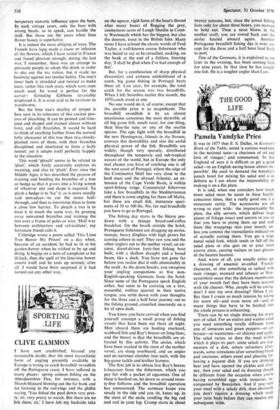CLIVE GAMMON
I have now established, beyond any reasonable doubt, that the most masochistic form of angling presently available in Europe is trying to catch broadbill swordfish off the Portuguese coast. I have suffered in many places: spring salmon fishing on the Aberdeenshire Dee, for instance, with a March blizzard blotting out the far bank and ice forming in the rod-rings and the ghillie saying, `You fished the pool down very pret- ty, sir, very pretty to watch. But there are no fish there, sir,' I have felt my backside take on the square, rigid form of the boat's thwart after many hours of flogging the grey, anonymous acres of Lough Sheelin in Coun- ty Westmeath which has the biggest, but also the dourest, trout in the British Isles. Many times I have echoed the classic words of Fred Taylor, a well-known coarse fisherman who was heard to say as he crouched, soaking, on the bank at the end of a fishless, freezing day, 'I shall be glad when I've had enough of this'.
But, for a combination of sharp physical discomfort and extreme unlikelihood of a catch, big game fishing in Portugal beats them all. Last year, for example, the total catch for the season was two broadbills. When I left Sesimbra earlier this month, the 1970 catch stood at one.
No one would do it, of course, except that the possible prize is so magnificent. The broadbill swordfish is by an almost unanimous consensus the most desirable of all big game fish, much rarer, for one thing, than blue-fin tuna or any of the marlin species. The epic fight with the broadbill in the new Hemingway, Islands in the Stream, conveys this desirability and also the awful physical power of the fish. Broadbills are widely, though very sparsely, distributed throughout the temperate and sub-tropical oceans of the world, but in Europe the only real chance you have of catching one is off the west coast of Portugal, where the edge of the Continental Shelf lies very close to the land mass and the abyssal Atlantic, an ex- tension of the Cape Verde Basin, is within sport-fishing range. Commercial fishermen take a few broadbills in the Mediterranean and there is some angling for them off Malta, but these are small fish, immature speci- mens of 50 to 100 lbs. No, for real broadbills you have to go to Portugal.
The fishing day starts in the bleary pre- dawn with a skimpy bread-and-coffee breakfast. On the beach outside the hotel, Portuguese fishermen are dragging up aiolas, stumpy, heavy dinghies with high prows for coming ashore in surf. They row you and the other anglers out to the mother vessel, an an- cient, diesel-driven forty-feet fishing boat built, with a shallow draught and a broad beam, like a duck. You have not gone far before you realise that it rolls abominably in the swell. As the dawn breaks, you recognise your angling companions as five non- English-speaking Germans from the hotel. Since none of the Portuguese speak English either, but seem to be carrying on a low, mournful, endless quarrel in their native tongue, you settle down with your thoughts for the three and a half hour journey out to the fishing ground, crouched insecurely on a bit of open deck.
You know you have arrived when you find yourself amongst a small group of fishing vessels that have been out there all night. Men aboard them are hauling mackerel, scabbard fish and Ray's bream on long-lines; and the theory is that the broadbills are at- tracted by this activity. The aiolas, which have been stacked in the stern of the mother vessel, are slung overboard, and an angler and an oarsman clamber into each, with the big-game tackle and leather harness.
The first job is to obtain live Ray's bream (chaputas) from the fishermen, which you pay for with a packet of cigarettes. One of these is hooked on, let down to around twen- ty-five fathoms and the broadbill operation has commenced. The oarsman keeps you steady in the tide and you sit, knees up, in the stern of the aiola, cradling the big rod and reel in your lap. Cramp starts in about
twenty minutes, but, since the actual fishing lasts only for about three hours, you manage to hold out. Then a siren blares in the mother craft, you are rowed back and the aiolas hauled aboard again. Another Portuguese broadbill fishing day is over, ex- cept for the three and a half hour haul back to port.
One of the Germans, it is explained to me later in the evening, has been coming here for nine years. In that time he has caught one fish. He is a tougher angler than I am.










































 Previous page
Previous page